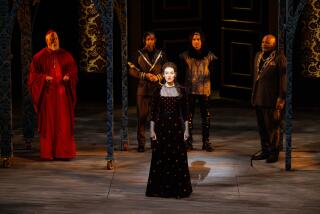Fond Memories and Tall Tales About the Ever-Elusive Bard
- Share via
Having bestrode literature like a colossus for the last few centuries and most recently having inspired Harold Bloom’s magisterial “Shakespeare: The Invention of the Human,” as well as the delightful, Academy Award-winning film “Shakespeare in Love,” William Shakespeare continues to dazzle and enchant us.
Mercifully little is known of his life: a fit reward, one feels, for a man whose soaring imagination, capacious intellect and boundless sympathies enabled him to create a body of work that truly merits the designation “universal.”
What fact or event of Shakespeare’s life could be more interesting than the characters who people his plays?
Robert Nye’s new novel, “The Late Mr. Shakespeare,” is not by any means a biography of the Bard. Nor, for that matter, is it a conventional novel, though it certainly is a work of fiction.
Its narrator is a retired actor named Pickleherring, living in a tiny room above a brothel and a pie shop in Restoration-era London. Now in his 83rd year, Pickleherring was a lad of 13 when the affable playwright invited him to join his acting troupe.
It is his intention to set down everything he knows about the great man. This “everything” includes not only his personal recollections, but also every tale--true, false or indeterminate--he’s ever heard about him.
“Sometimes,” muses Pickleherring, “I think that no one has ever been so many men as this man. Like the Egyptian Proteus, he exhausts all the guises of reality. . . . Not that WS was a god, you understand. . . . He was just a man like any other man. Only . . . more so.”
The key to Shakespeare is his writing. And yet his capacity to invent and imagine was so great, it would be foolish to seek his identity in any single character he created.
Or, as Pickleherring puts it: “He becomes the men and women he writes about. Yet none of them is him. . . . I say that the true life of William Shakespeare is in his plays and his poems. Yet the man himself, to my fingers, we touch nowhere in his work.”
*
There’s a hint of madness--or, in any event, zaniness--in Pickleherring’s method of commemorating his beloved WS.
Nye, a British novelist, poet and critic adept in the art of impersonating characters from ages past (his previous novels include “Falstaff,” “Merlin,” “The Memoirs of Lord Byron” and “Mrs. Shakespeare”), skillfully summons up the sights, sounds and language of Pickleherring’s time and place. But historical realism, indeed realism of any kind, is not his aim.
Nye playfully has Pickleherring employ phrases and ideas that we recognize as coming from the works of writers not yet born in his lifetime, including William Blake, D.H. Lawrence and T.S. Eliot.
The taller the tale, the more Pickleherring enjoys telling it. Nor does it trouble him that the various tales contradict one another. One story claims Shakespeare’s natural father was a lecherous vicar aptly named Bretchgirdle, who tricked Mary Shakespeare into a quick tumble. Another claims the lad’s parents were John Shakespeare and Queen Elizabeth out on a country jaunt.
The stories are bawdy, fantastic, nonsensical, poignant, bizarre and occasionally even believable. Do they tell us much about William Shakespeare or his works? Probably not.
Pickleherring’s (and Nye’s) aims in writing this “memoir” are excellent ones. That any great artist, let alone the incomparable Bard, encompasses multitudes, that it is impossible to pin down his essence but possible to speculate infinitely about him: These premises are unimpeachable. Pickleherring promises us “country history.”
This is not the dry, cynical, logical, fact-riddled “town history” that begins “in the shadow of law courts” and ends up in universities, but the credulous, “fanciful and maggoty” tales told “by the glow of the hearth” that pass into legend and ballad: “Easy to mock, it strains belief.”
“But sometimes it catches the ghostly coattails of what is otherwise ungraspable. It is the only possible way of accounting for Mr. Shakespeare.”
But perhaps there is no way of accounting for Mr. Shakespeare. The tales presented here are more likely to summon up memories of Rabelais or Boccaccio. They convey something of the Bard’s playful inventiveness, but lack his profundity and passion.
Still, they do manage to evoke the flavor and feel of Shakespeare’s England--and of the already very different place that it had become by the latter half of the 17th century, when Pickleherring sits down to summon up his nostalgic recollections of a greener, sweeter world.
More to Read
The biggest entertainment stories
Get our big stories about Hollywood, film, television, music, arts, culture and more right in your inbox as soon as they publish.
You may occasionally receive promotional content from the Los Angeles Times.










